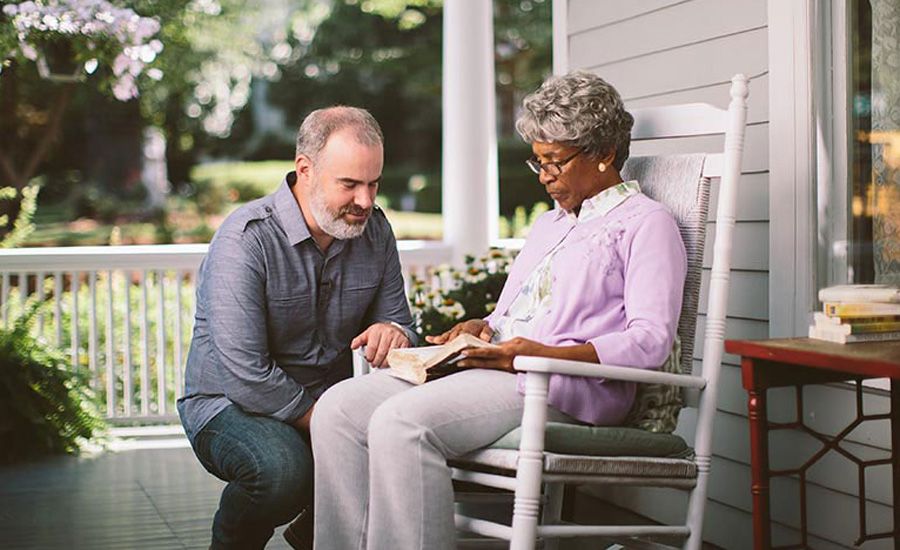When War Room landed in theaters Labor Day weekend, no one could’ve predicted the low-budget faith-based film focused on prayer would ever end up No.1 at the box office. Fast-forward a couple of months, the film has now made millions of dollars, been seen by hundreds of thousands of movie-goers and started a prayer revival across the country.
We had the opportunity to talk to director Alex Kendrick before the film was released earlier this year – when he and his brother, fellow filmmaker Stephen Kendrick, were unsure yet hopeful about the reach and impact their small movie might have – and we thought it be a good idea to check back in with him now that the film is set to hit shelves in DVD form later this month.
From the incredible reception by audiences to how the brothers prayed War Room into being, and yes, those poor movie reviews, Kendrick shared what went into making the film and how the journey isn’t over yet.
War Room debuted huge in terms of audience numbers. What was it like seeing that reaction and reception from movie-goers?
It’s thrilling but it’s obviously an indication that it really touched the audience. We’ve heard of people seeing it four, five, even six times. There’s a sweet, older lady that had never been to see a movie in a theater and her children talked her into going to see it. She was so moved by the film that she went back five times, taking her friends and neighbors to go see it. It just proves the movie really did touch a nerve.
You’ve been vocal about how important is to you to have your films inspire people’s faith life. Have you had any feedback from fans of the film?
To hear people’s testimonies about how they’ve renewed their passion for prayer, making it a priority, it’s amazing. We spoke with a pastor up in Minnesota, he was talking with a local construction contractor and the contractor told this pastor, ‘The weirdest thing is going on. I’ve been hired eight times this month to remodel closets to make space for prayer in these people’s homes.’ He hadn’t seen the movie at the time but once he did, he understood. We would never say the magic is in the closet itself, but people are making prayer a priority, finding a place where they’re not distracted in order to pray.
Do you think the success of the film is a product of timing, good content or both?
All we knew to do was to spend that season of prayer saying, ‘God, what do you want this next movie to be about?’ He prompted us to make it about strategic praying. So when we did it, we prayed that the Lord guide the entire team to the right release date, the right marketing strategy. We devoted the whole project to prayer and I see how God responded to that. I would never say that we’re smart enough to figure out how to make a hit movie. All I know to do is to pray and do our best, but we really did seek the Lord and I really did see his fingerprints on each part of this movie. It did seem like the timing was appropriate, with everything going on in our culture, with racial issues with the need for prayer and everything going on in politics – I think it just encouraged a lot of people.
Each of the films you’ve made focuses on a specific theme. Why make a movie about prayer?
Most people, especially believers, would say that they pray to some degree but almost all of them say that they do not pray enough. That was telling for us. When we asked people, ‘Do you have a strategy for finances, or retirement or your health?’ many people did. When we’d ask, ‘Well, how do you pray strategically?’ we’d often get blank looks. Prayer is what we’re called to do on a regular basis to seek the Lord. You never regret spending time in prayer. You never say ‘Wow that was totally pointless.’ No one says that that has a walk with God.
Was prayer a big part of your life growing up and did it influence your decision to venture into faith-based filmmaking?
My father was a minister, my mom was a Christian school teacher, so we did grow up in that atmosphere but I would say it wasn’t until I was in my 20s that I made my own walk with God a priority. The fact that I grew up in a faith-friendly home, I took it for granted. I didn’t know what else to compare it to because it was all that I knew, but in making my faith my own — where I’m not a believer in Jesus Christ just because my parents are, where I now have my own relationship with the Lord — that was very important to me. In my 20s, that developed and is continuing to develop. The Lord continues to give me milestone events in my life that increase my faith, increase my understanding, and increase my thirst.
It’s not just the film that you’ve dedicated to this idea of strategic prayer, you also have devotionals, bible resources and a book accompanying the film. Is it important to you to reach out to audiences after they leave the theater and offer them something more than just entertainment?
It’s very important to us that the movie not just be this event that you go to where you’re entertained or inspired for a couple of hours. When people walk out of the theater, we don’t want to stop there, we want to present them with whatever tools we can to help them continue walking that path. The Battle Plan for Prayer was written specifically for someone who saw War Room and said ‘I need to pray more specifically but how do I do that?’ It gives you a better understanding of what prayer is and what it is not. It’s not just treating God like a genie in a lamp. It’s part of a two-way communication where we acknowledge the Lord and open our hearts for Him to communicate back to us. Our goal is, what can we provide to help people take that next step and learn what prayer can be?
Historically, critics haven’t been kind to most faith-based films. How do you handle having a huge success with movie-goers but poor reviews by movie critics?
There is an element of low-budget quality to a lot of faith-based films and I’m happy that it’s slowly growing, but it takes time for that to happen. There are some valid criticisms of Christian films, but that’s slowly getting better. From a spiritual standpoint, critics that review Hollywood movies have a steady diet of films that aren’t interested in faith themes and honoring the Lord, they’re just interested in pure entertainment. When you have a steady diet of those things and then you’re jerked into the nurture and nutrition of a faith film, it can catch you off guard and they don’t know what to do with it. If you look at all of our films on Rotten Tomatoes, instead of critics and audiences agreeing, we usually have very high audience approval ratings and very low critic ratings. There’s an ocean between those two. What that tells us is that the critics that review Hollywood movies don’t necessarily resonate with our films. You know, that’s okay. We don’t make these movies trying to win Academy Awards, we make them to minister to people. We definitely want to improve the quality and craftsmanship, but our goal is to honor the Lord by drawing people to Him.
War Room is out on DVD Dec. 22nd.




